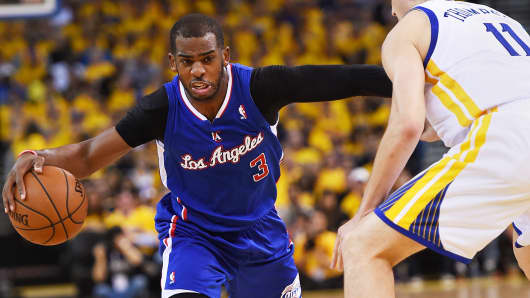
Getty Images
Chris Paul #3 of the Los Angeles Clippers drives on Klay Thompson #11 of the Golden State Warriors in Game Four of the Western Conference Quarterfinals during the 2014 NBA Playoffs at ORACLE Arena on April 27, 2014 in Oakland.
The lack of such a vote would rip the heart out of Mr. Sterling's billion-dollar lawsuit against the NBA. Mr. Sterling and his lawyer would have to drop those claims that depend on the sale being forced or face punishment if they don't — and this time, the punishment would be imposed by a federal judge, not the NBA. (The separate privacy claim Mr. Sterling asserts in his complaint seems a reach, among other reasons, because the NBA didn't illicitly record Mr. Sterling's comments.)
Read MoreSterling's Clippers bet better than Apple, gold
But would a voluntary sale end this saga altogether? And would such an outcome make what has transpired in this matter over the weeks since Mr. Sterling's vulgar, racist private and public remarks irrelevant should something like this occur again? The bad news is that, without Mr. Sterling's surrender, the answer to the first question is "no." The good news is that, regardless of the answer to the first question, the answer to the second question is also "no."
Let's deal with the bad news first. The voluntary sale may not extinguish Mr. Sterling's right to challenge, as a breach of the NBA's contractual obligations to him, the $2.5 million fine and lifetime ban that Commissioner Adam Silver assessed against Mr. Sterling personally. The deal Mrs. Sterling made with the NBA reportedly requires her and the Sterling trust, of which Mr. Sterling remains a beneficiary, to pay to defend the NBA in any lawsuit by Mr. Sterling against the league and to pay any damages in the unlikely event that he wins.
Mr. Sterling is a lawyer and a businessman. Unless the indemnification agreement were invalidated, Mr. Sterling would have to be completely irrational not to realize that such a fight would make no sense. Then again ...


